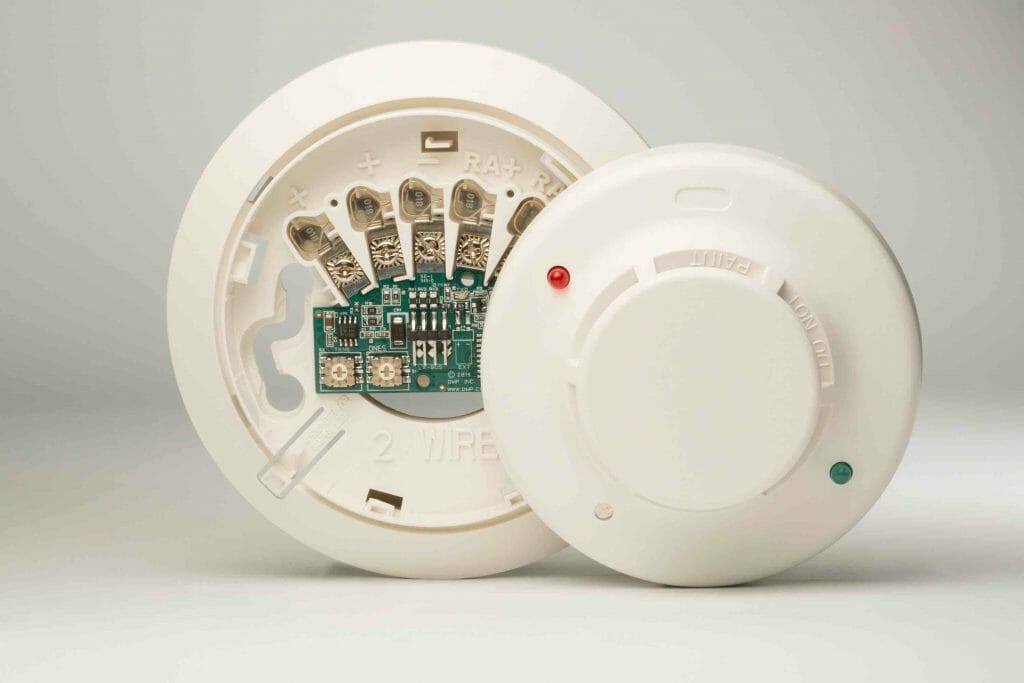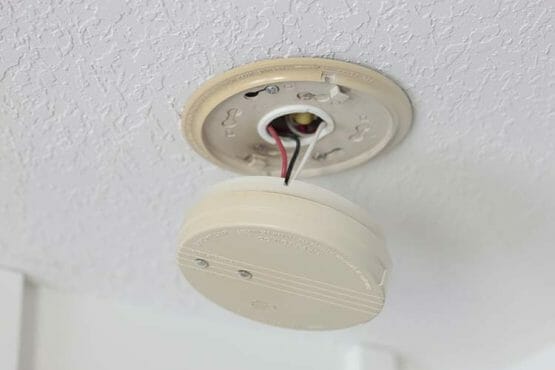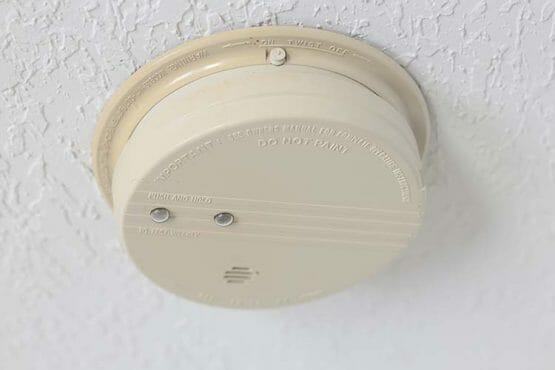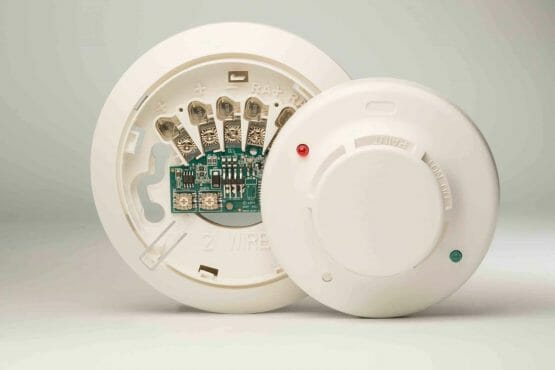Quick Navigation
One of the most common questions asked about home protection is how long smoke detectors last?
Knowing how long your smoke detector will last is crucial. Many smoke detectors have an electronic part’s lifespan of 8-10 years, while their batteries can last from 6 months to 1 year.
Replace smoke detectors if they have expired! Usually, it’s good practice to write your installation date inside the cover so you know when to replace them, if you can’t find this you can use the manufacturing date located inside the device.

The Lifespan Of Carbon Monoxide And Smoke Detectors
Most people don’t realize that the smoke detectors in their homes are only suitable for ten years. It is helpful to know to change smoke detector batteries every year to keep them in prime working order. An ideal smoke detector uses a 9-volt battery, which lasts about a year, although some models use AA, C, or D batteries depending on the model of the alarm. (1)
A carbon monoxide detector lasts about seven years. We suggest changing it every five years to detect carbon monoxide due to rust and corrosion after that time.
When this happens, you may not notice it because the battery smoke detectors have a design to work as long as possible. But, when a carbon monoxide detector stops working correctly, it is essential to replace it immediately. That’s why it is helpful to remember that they need a change every five years.

Symptoms To Substitute The Smoke Detector
Your smoke detector is speaking to you. It’s telling you the battery is low and needs a change. As a responsible homeowner, you should go to the store right away and purchase new batteries for your smoke detector.
Keeping your smoke detectors properly maintained is essential. If you don’t replace the battery, it may not work during an emergency. There are many reasons that appliances start making strange noises, including a loose wire or a dirty motor coupling or overloading them by starting multiple appliances simultaneously.
Keep your family safe by testing your dual sensor smoke alarm monthly. It’s helpful to open windows and doors before testing the unit to make sure you hear the dual-sensor smoke alarm. Testing it regularly is essential because if something is wrong with your unit, whether a low battery or a burned-out smoke alarm photoelectric sensor, you won’t know until you test it (the smoke alarm photoelectric sensor is fragile). (2)
Do you plan to be home today? If not, remember that while you’re away, your home should be safe from fires. Prevention is the key when it comes to protection. The main indications that you need to substitute the smoke detector are:
- Constant battery replacement chirp
- Late operation
- Too frequent false alarms
- Rusty smoke detector parts
How To Check The Smoke Detector
Are you looking for an easy way to test your smoke detector? If you’re a homeowner, you should check your smoke detector and fire alarm monthly to ensure they are in proper working order. The process is simple.
1. Choose a time when children are in school or otherwise occupied and tell the family where you will do the testing. You may even want to test the alarm at dinnertime, so you know it will work properly.
2. Any member of the family should be at a great distance from the house. This step serves to check if the sound of the alarm reaches every corner of the house. In those places where the sound is too weak, there is a good solution. You need to install additional smoke detectors to increase the sound in those problem areas.
3. Press and hold the test button on the device for a few seconds. The user should begin to hear a piercing, loud sound as the user presses the button. It is helpful to add new batteries when the sound is too weak or no sound is present. The user can install new batteries even if it is a smoke detector that has wires. Cleaning the grilles of debris and dirt that blocks proper operation is also helpful.

How To Get Good Use Out Of A Smoke Detector
You can test your smoke detector by pressing the button that triggers the alarm. Damage or dirt can impair the detector’s sensitivity, and you want it to work correctly if there’s a fire. Regularly check that all electrical connections are secure in case of water damage from flooding or high humidity.
Tips for Maintenance
Everyone needs new batteries from time to time; paying attention when the smoke alarm emits some intermittent sound is helpful. Avoid removing the cover but implement a proper cleaning of the smoke detector. A vacuum cleaner may be sufficient for this purpose.
Every month the user needs to test the alarm to check the correct functioning of the device.
Usually, the regular battery life of the smoke detector provides 6 months of use. Adding high-quality batteries once every 6 months may be sufficient.
If you plan to cook in the kitchen or a separate area, make sure you have 20 pounds ABC dry chemical fire extinguisher. If you are not planning to cook, make sure you have a 5-pound “K” class fire extinguisher. Make sure there is at least one extinguisher on every floor, including the basement and attic space.
Great Set-Up
Smoke detectors are a necessity in every home. You should have at least one hard-wired smoke detector installed inside each bedroom or next to the sleeping area door, which is usually a hallway.
A smoke detector is functional on each floor and should be set up near each bathroom and stairwell. There should be a smoke detector in the kitchen, near any common area where cooking occurs (this may include the den or living room), and in the laundry room.
Fire Evacuation Plan And Smoke Detectors
To improve the fire evacuation plan, install smoke alarms in bedrooms and outside each separate sleeping area. Don’t forget to install alarms on every level of your home and in the basement. Then, stay on top to change smoke detector batteries!
You may not realize it, but a fire could start anywhere and spread quickly through your home. By installing smoke alarms, you give yourself a chance to get out alive.
References:
(1) AA, C, or D batteries – https://www.homedepot.com/c/ab/types-of-batteries/9ba683603be9fa5395fab90ca66daf9
(2) photoelectric sensor – https://na.industrial.panasonic.com/products/industrial-automation/industrial-sensors/photoelectric-sensors-laser-sensors

